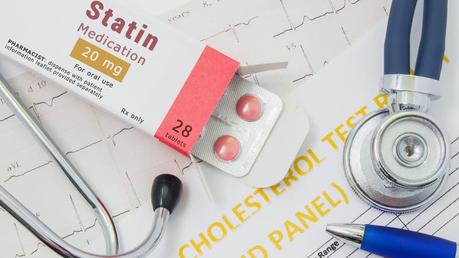
Is it a witch hunt and a purposeful attack meant to discredit statin opponents?
Or, is it a genuine plea to try and help people live longer and better?
I wish I knew the real answer, but there is no question that the recent article in the Daily Mail drove a stake through the middle of the statin and cholesterol debate.
Daily Mail: The deadly propaganda of the statin deniers: The drugs DO protect you from heart attacks but as this devastating investigation reveals thousands are refusing themThe article, written by the Daily Mail's health editor Barney Calman, presented a clear opinion with his title alone: "The deadly propaganda of the statin deniers." He claims that three prominent cholesterol and statin "deniers," Zoe Harcombe Ph.D., Malcolm Kendrick MD, and Aseem Malhotra MD, are spreading false information, confusing the public and putting thousands of lives at risk.
Those are bold and serious accusations. The use of inflammatory and accusatory language certainly gives this piece the air of a witch hunt, but the author does include interviews with experts and quotes from the medical literature. Does his argument hold up to scrutiny?
While part of his message does make sense, some of it is off-base. Let's break down the argument.
Do statins reduce the risk of heart attacks and strokes?
Right off the bat, the Daily Mail article cites the often quoted statistic of a 50% reduction in heart attacks and a 30% reduction in strokes with statins. Drs. Harcombe, Kendrick, and Malhotra have rightly pointed out many times that these are relative risks, and don't tell an accurate portrayal of true benefit.
What are the absolute benefits? Is the 50% reduction a decrease from a 1% risk to a 0.5% risk? It turns out we don't know. The Cholesterol Treatment Trialists' (CTT) Collaboration, the main publisher of comprehensive statin efficacy data, refuses to release the raw data for third-party verification. It claims a nondisclosure agreement with the pharmaceutical companies who funded the research. Drs. Harcombe, Kendrick, and Malhotra are certainly right in questioning the accuracy and reliability of this data, especially since we can't know the absolute risk reduction for their claims.
Looking at individual primary prevention trials, the absolute risk reduction varies between 0.2% and 1% risk reduction. That takes on a different urgency than the quoted 50% relative risk reduction.
Are statin opponents on par with the anti-vaccine crowd?
To his credit, Mr. Calman acknowledges the faulty demonization of first dietary cholesterol and then dietary saturated fat. He points out the weakness or complete lack of evidence to support those claims once believed as true (which we should point out would likely still be propagated as true if it weren't for individuals brave enough to stand up and question the status quo).
He then continues, however, by quoting statin researcher Sir Rory Collins as he compares the opposition to statins to the "disgraced pediatrician.... (who) fabricated evidence to support his idea that... [routine vaccines] triggered autism in infants." First of all, Drs. Harcombe, Kendrick and Malhotra are not fabricating evidence. They are interpreting the studies done by others. They are bringing to light contradictory studies that are frequently ignored, they are presenting the data with a different perspective, and they are calling out the holes in the data. It is incendiary and incorrect to compare them to anyone who purposely fabricates evidence. That is clearly taking the attack too far, in my opinion.
Is cholesterol completely harmless?
Observational trials such as the Framingham Heart Study and Multiple Risk Factor Intervention Trial (MRFIT) show a clear association that as total cholesterol and LDL increase so does the risk for heart attacks and death. While the strength of the association may be in question, the statistics point to a clear association. Again, not cause and effect, but rather an observed association.
On the other hand, Dr. Zoe Harcombe points out the data she evaluated from the World Health Organization (WHO) from 192 countries showed better survival with increasing cholesterol. Other observational studies in subjects older than 65 years old show a better survival with higher levels of cholesterol. That is enough for some to question cholesterol's role in death and disease. It does suggest a potential bimodal situation where high cholesterol is associated with both a small increased risk in the young and protection in the elderly. Of course, observational data will not definitively answer the question. It merely suggests an association.
Do statins save lives?
Dr. Kendrick cited an observational paper showing that statins increase life expectancy by a mere 3.5 days. Mr. Calman takes issue with this citing that numerous randomized studies (a higher quality of evidence) have shown reduced risk of death with statin prescriptions. While that statement is true, it is also incomplete. There have also been numerous statin trials that have not shown reductions in all-cause mortality. The data is truly split.
An important consideration is to whom are we specifically referring? Studies have not shown any mortality benefit for lower risk primary prevention in women, and many haven't shown any mortality benefit in men either. For secondary prevention (when statins are used to treat people with established cardiovascular disease) the mortality data is better, but even then it is estimated 83 individuals need to take the drug for five years to prevent one death.
Mr. Calman then breaks from scientific integrity again to state:
For anyone in any doubt, UK heart disease and stroke deaths plummeted by two-thirds between 1980 and 2013, partly due to fewer smokers and better emergency care, but also because of wider statin use.
I would like to understand how he was able to know the impact of statins above and beyond the development of better medical techniques and, more importantly, the decline in smoking.
Are the risks of statin side effects over-hyped?
Mr. Calman points out that Dr. Malhotra has made claims that 75% of statin users quit within the first year. I echo Calman's concern as I am not aware of a quality study showing that the rate is this high. On the other hand, others quote a 1% or less side effect incidence in major statin trials. What they fail to mention is that many of those trials have a "run in" period where everyone is given a statin and those who have side effects are excluded from participating in the trial.
Truly measuring statin side effects requires "real world" studies, not pharma-sponsored trials designed to minimize the reporting of side effects.
Are prominent statin proponents heavily paid by pharmaceutical companies?
There is no denying the vast majority of the statin trials are run by doctors with long lists of conflicts of interest. That may not completely invalidate the data, but it does raise the question if we are seeing the whole picture. This is an important concept that Drs. Harcombe, Kendrick and Malhotra are vocal about. The article quotes Mr. Collins saying that he does not accept funding from pharma, but that does not change the fact that much of the data was acquired in large pharma-sponsored trials.
More witch hunt than fact promotion
While the debate may not be clear one way or the other, the important point is that there is a debate. Attempts to discredit and slander opponents of a popular view point do nothing to further the scientific discussion of cholesterol and statins. It's okay to question scientific norms and disagree with consensus. I would even go so far as to say we should all question the consensus from time to time. The key is doing it in a way that is based in science, is not personal, and is aimed at getting closer to the "truth."
I am not sure the piece in the Daily Mail had that intention. Even if you don't agree with everything Drs. Kendrick, Harcombe and Malhotra say, they should be applauded for their efforts to further the discussion and challenge the status quo.
Thanks for reading,
Bret Scher, MD FACC


